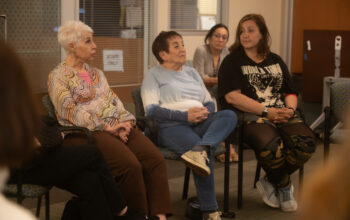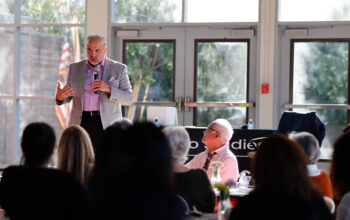Radical and political changes have permeated into several facets of people’s lives, including art.
That influence has spilled over into the Pierce College English Department, where the literary magazine is exploring life under current politics.
“Direction” is a yearly publication that is a collaboration between student voices and a group of editors who shape submissions such as poetry, short stories, photographs and cartoons together into a 95-page literary magazine.
One of the student editors, Nicole Nelson, said that in the current political and social climate, she feels the word is filled with a lot of negativity. She said many people’s Facebook feeds are filled with war, anger, hate and bigotry.
“There’s also a lot of love and, with all these conflicting emotions happening, you are still trying to live a life,” Nelson said.
She believes the magazine is one way to combat the pessimism.
“I think something like this is important because it gives you a creative outlet to pour it out onto paper, and sometimes, these stories become their own living breathing things that need to come out of you.”
Emily Anderson, the adviser of the magazine, said putting students’ work in one centralized collection can feel rewarding for students whose work gets approved.
“I think there’s something very validating about being published,” Anderson said. “It says we care about your voice, we want to hear what you have to say and we respect your artistic contribution to the community.”
Anderson said that in the past, the English Department offered a course focused on creating the literary magazine.
Anderson, who has been the faculty adviser since 2013, said that ever since the department stopped offering the magazine production class, she and two student editors have been in charge of creating “Direction.”
The trio who produced the 2017 edition of “Direction” consists of Anderson and two student editors, Nicole Nelson and Daniel Miranda.
The three people work individually due to conflicting schedules, but organize and delegate the work that needs to be done.
“We all work really well together,” Nelson said. “The three of us are just coming into this with positivity and with a really strong desire for the voices on campus to be heard.”
According to Nelson, the first months of the spring semester were the most worrisome because “Direction” needed to gather enough student submissions.
Flyers were posted around campus, and the magazine used social media posts to promote the publication. Anderson said Nelson and Miranda’s tedious efforts to spread the word resulted in more than 100 literary mailed submissions.
“We were hoping to get enough to even publish, but now it’s a competitive situation that we have more than we need,” Nelson said. “So now it’s more about merit, and won’t be a ‘everyone who plays gets a trophy’ kind of thing.”
Although Anderson is the faculty advisor, she steps back and the student editors decide which pieces are published in “Direction.”
The two major criteria that Nelson and Miranda consider when deciding which pieces to publish in the magazine are literary quality and the variety of voices.
The magazine has been on campus for several decades, with the first edition dating back to 1959.
Anderson said she hopes that when she is no longer the magazine’s faculty adviser, someone will continue “Direction” and maintain the long tradition.
Nelson said the magazines serve as a way to preserve the past.
“They end up being like our school’s time capsule,” Nelson said. “Very physical, tangible, something that you don’t have to dig into the earth to get. It’s just on a bookshelf waiting to be read.”
Both Nelson and Miranda said that being editors has been great because they get to experience a rollercoaster of emotions on a daily basis and are becoming stronger writers because of the positions they are in.
Nelson said she got to know the other writers by reading the submissions,.
“There’s always a piece of you in every character you write,” Nelson said. “There’s something you wish you were, something you wish you could do, something you wish you could say. Some of that peeks into your writing, and I think it is telling of those people who are putting things down on paper.”
Submissions are accepted year-round, and students who would like to send their work to be considered for next year’s publication are encouraged to do so.
“Don’t second guess yourself. Make sure your story is something you want to tell people,” Nelson said. “If you believe in your work, other people will want to read it. Just submit.”


